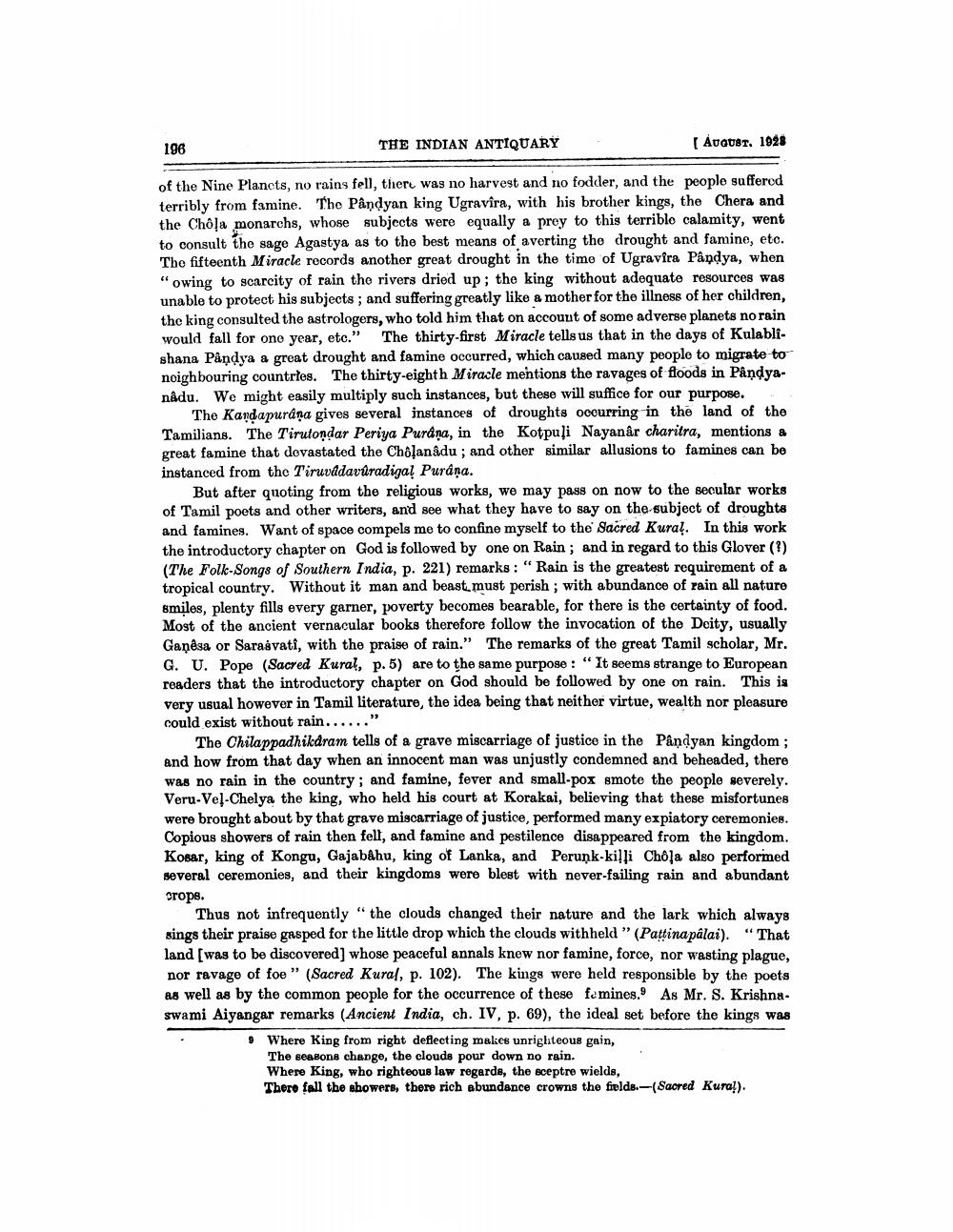________________
196
THE INDIAN ANTIQUARY
(August, 1928
of the Nine Plancts, no rains fell, there was no harvest and no fodder, and the people suffered terribly from famine. The Pândyan king Ugravira, with his brother kings, the Chera and the Chôļa monarchs, whose subjects were equally a prey to this terriblo calamity, went to consult the sage Agastya as to the best means of averting the drought and famine, etc. The fifteenth Miracle records another great drought in the time of Ugravira Påndya, when "owing to scarcity of rain the rivers dried up; the king without adequate resources was unable to protect his subjects; and suffering greatly like a mother for the illness of her children, the king consulted the astrologers, who told him that on account of some adverse planets no rain would fall for one year, etc.” The thirty-first Miracle tells us that in the days of Kulabli. shana Pandya a great drought and famine occurred, which caused many people to migrate to noighbouring countries. The thirty-eighth Miracle mentions the ravages of floods in Påndyanadu. We might easily multiply such instances, but these will suffice for our purpose.
The Kandapurana gives several instances of droughts occurring in the land of the Tamilians. The Tirutondar Periya Purana, in the Kotpuļi Nayanar charitra, mentions a great famine that devastated the Cholanadu; and other similar allusions to famines can be instanced from the Tiruvddavúradigal Purana.
But after quoting from the religious works, we may pass on now to the secular works of Tamil poets and other writers, and see what they have to say on the subject of droughts and famines. Want of space compels me to confine myself to the Sacred Kural. In this work the introductory chapter on God is followed by one on Rain; and in regard to this Glover (?) (The Folk Songs of Southern India, p. 221) remarks: "Rain is the greatest requirement of a tropical country. Without it man and beast must perish ; with abundance of rain all nature smiles, plenty fills every garner, poverty becomes bearable, for there is the certainty of food. Most of the ancient vernacular books therefore follow the invocation of the Deity, usually Ganêsa or Sarasvati, with the praise of rain." The remarks of the great Tamil scholar, Mr. G. U. Pope (Sacred Kural, p.5) are to the same purpose : “ It seems strange to European readers that the introductory chapter on God should be followed by one on rain. This is very usual however in Tamil literature, the idea being that neither virtue, wealth nor pleasure could exist without rain......"
The Chilappadhikdram tells of a grave miscarriage of justice in the Pandyan kingdom ; and how from that day when an innocent man was unjustly condemned and beheaded, there was no rain in the country; and famine, fever and small-pox smote the people severely. Veru-Vel.Chelya the king, who held his court at Korakai, believing that these misfortunes were brought about by that grave miscarriage of justice, performed many expiatory ceremonies. Copious showers of rain then fell, and famine and pestilence disappeared from the kingdom. Kobar, king of Kongu, Gajabahu, king of Lanka, and Perunk-killi Chola also performed several ceremonies, and their kingdoms were blest with never failing rain and abundant crops.
Thus not infrequently " the clouds changed their nature and the lark which always sings their praise gasped for the little drop which the clouds withheld ” (Pattinapalai). "That land (was to be discovered) whose peaceful annals knew nor famine, force, nor wasting plague, nor ravage of foe" (Sacred Kural, p. 102). The kings were held responsible by the poets as well as by the common people for the occurrence of these femines. As Mr. S. Krishnaswami Aiyangar remarks (Ancient India, ch. IV, p. 69), the ideal set before the kings was
9 Where King from right deflecting makes unrighteous gain,
The seasons change, the clouds pour down no rain. Where King, who righteous law regarde, the soeptre wields, Thero fall the showers, there rich abundance crowns the fiulda-(Sacred Kural).




